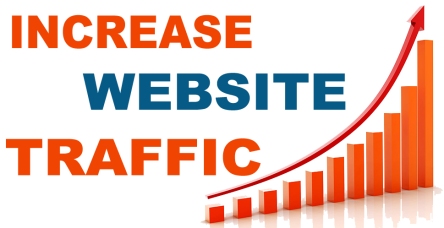
A good business website is like having an extra employee—one who works 24/7 and can be the face of your company, give information, answer queries and even make sales. But what good does that do you if you aren’t getting visitors to your site? In this post we’ll cover thirteen of the many ways to drive traffic to your website.
The Importance of Website Traffic
Website traffic is both an important indicator and driver of business growth. It can help you to:
• See how well your marketing is working
• Gather insight about your audience to make decisions
• Improve your SEO and search engine credibility
• Generate more leads, increase conversions, and get more customers
How to Get More Website Visitors
There are 1.24 billion websites in the world. That’s a lot of competition, but keep in mind that you’re not trying to attract all internet users. Your goal is to get more people in your target audience to visit your site. Below are some simple ways to increase the amount of traffic that you are getting to your website.
1. Perform On-Page SEO
There are many SEO tactics you can perform on each of your website pages to increase their rank in search engines and get more visitors. This includes producing high-quality content that your audience is searching for, and writing concise meta descriptions for your pages. The meta description appears below your URL in search results. Knowing what a page is about and what will result in a click makes users much more likely to do so.
2. Get Listed
Another way to increase traffic to your website is to get listed in online directories and review sites. For most of these sites, your profile will have a link to your website, so actively updating these listings and getting positive reviews is likely to result in more website traffic.
3. Post to Social Media with Hashtags
Use social media to promote blog posts and other useful content on your website. This way you can get your social media followers to your site, as well as users in your followers’ networks who share your content.
By adding hashtags to posts that promote your website pages, you can extend your reach beyond your network and get discovered by users searching for your products and services.
Related: Hashtag Marketing eBook
4. Use Landing Pages
Create landing pages specific to your offers, such as for redeeming discount codes, downloading a free guide, or starting a free trial. Landing pages are another source of traffic to your website. Plus, they contain the details users need in order to move forward and convert.
5. Target Long-Tail Keywords
While short-tail keywords are often searched more frequently, it is more difficult to rank for them on search engines. Targeting long-tail keywords, on the other hand, gives you a better chance of ranking higher (even on the first page) for queries specific to your products and services—and higher ranking means more traffic. Plus, as search engines and voice-to-text capabilities advance, people are using more specific phrases to search online.
6. Start Email Marketing
Sending out regular newsletters and promoting offers through email is a great way to stay in touch with your customers and can also help to get traffic to your website. Provide useful information and links to pages on your website where they can learn more, such as through blog posts and offer landing pages. Just make sure that you don`t continually bombard your readers with emails or your customers will either disengage with, delete, or unsubscribe from your emails.
Also, put careful thought into your email subject lines. These heavily influences whether or not a user opens your email. If your emails never get opened, they can’t supply traffic to your site!
7. Advertise Online
Online advertising is perhaps the most basic way to get more people to visit your site. Social media, paid search, and display advertising are all excellent channels for PPC advertising to boost website traffic.
8. Guest Blog
Having a micro-influencer publish a blog post on your site can help to increase your web traffic, as they are likely to share the post with their large audience. It can also help to add more variety to your content and show your visitors that you are active in your field. Alternatively, you could ask the influencer to mention your business in their own review or round-up post, or you could turn an interview with the influencer into a blog post that is likely to get traffic.
You can also be a guest blogger. Identify complementary businesses in your area whose audience is relevant to your business. See if you can contribute a post to their blog with a link back to your website. Make sure your content is relevant and useful to their audience, so that it’s more of an even exchange.
9. Engage Online
Be active in online groups and on websites that are relevant to your business and community. Comment on blogs and social media posts, answer questions people are posting, and participate in conversations about your industry. The more you engage with your community, the more exposure and profile visits you get. If your social media profiles contain a link to your website, then you’ve turned your engagement into another channel for website traffic. Just be sure to engage moderately and in a sincere way, and avoid including links to your website in your comments
Just be sure to engage moderately and in a sincere way, lest you hurt your online and business reputation. Also, avoid including links to your website directly in your comments, as this is spammy. Increased traffic should not be the goal of your engagement, but rather a secondary result.
10. Learn from Your Analytics
Use tracked links for your marketing campaigns and regularly check your website analytics. This will enable you to identify which strategies and types of content work, which ones need improvement, and which ones you should not waste your time on.
These are only some of the many strategies you can use to drive traffic to your website. Getting more website visitors does not happen overnight. It takes hard work and dedication, but we’ve eliminated the hard part for you: knowing what to do in the first place. Implement a mix of these strategies and you’ll start seeing improvements in your website traffic.
Source: https://thrivehive.com/ways-to-drive-traffic-to-your-website/
It’s really great techniques provide here I hope it will help a lot. If you want to increase website traffic then you should follow these techniques.
In these days, everyone wants to run their business online, wants more traffic, sales and leads so that they can grow but until and unless you will not do online marketing for your online business till then you will not achieve your goal. So, if you want to achieve your goal then you should opt online marketing service by seo experts or seo agency.





